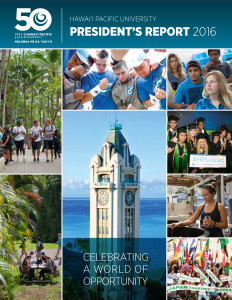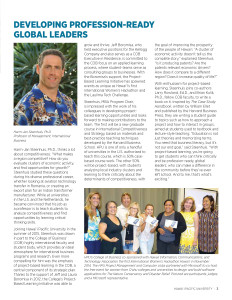From Harvard-developed MBA coursework to a new book deal, Harm-Jan Steenhuis, Ph.D., works to make the HPU College of Business a center of project-based learning
By Sara Ecclesine
Hawaii Pacific University MBA Program Chair Harm-Jan Steenhuis, Ph.D., thinks a lot about competitiveness. “What makes a region competitive? How do you evaluate clusters of economic activity, and find opportunities for growth?” Steenhuis studied these questions during his diverse professional career, whether looking at aviation technology transfer in Romania, or creating an export plan for an Indian transformer manufacturer. While at universities in the U.S. and the Netherlands, Steenhuis became convinced that his job as an instructor is to teach students to analyze competitiveness and find opportunities by learning critical thinking skills. And the path to fostering critical thinking is project-based learning.
Steenhuis joined HPU in the summer of 2015, drawn in part to the university’s highly international faculty and student body, which provides an ideal atmosphere for international business research. Even more compelling for Steenhuis was HPU’s culture of project-based learning, a central component of the College of Business (COB) strategic plan. In 2012, Jeffrey and Laura Alberts-Boromisa funded a Project Learning Initiative and Academic Improvement Fund at HPU’s COB. Jeffrey Boromisa, also serving as Executive in Residence, sought to increase the competitiveness of the COB through the establishment of an applied learning process, where student-teams serve as consulting groups to local businesses. The Project Learning Initiative has spawned events as unique as Hawai’i’s first International Women’s Hackathon.
After his arrival at HPU, Steenhuis immediately began developing project-based learning opportunities that increase the rigor of the COB. The first will be a new graduate course in International Competitiveness and Strategy, based on materials developed by the Harvard Business School. HPU is one of only a handful of universities in the U.S. authorized to teach this graduate course. The course is 50% case-based course work supported by materials and best-practice teaching techniques developed by Harvard. The other 50% will be project-based, with students analyzing local industry clusters and learning to think critically about the determinants of competitiveness, with the goal of improving the prosperity of the people of Hawai’i. “A cluster of economic activity doesn’t tell us the complete story,” explained Steenhuis. “Is it producing patents? Are the patents relevant economic drivers? How does it compare to a different region? Does it increase quality of life?”
Steenhuis is so enthusiastic about project-based learning that he’s writing the book on it, with co-authors Larry Rowland and Brian Kulik. Inspired by The Case Study Handbook, written by William Ellet and published by the Harvard Business Press, Steenhuis and his collaborators are writing a student guide to topics such as how to approach a project and how to interact in groups, aimed at students used to textbook and lecture-style teaching. “Education is not just theories and memorizing terms. You need that business literacy, but it’s not our end goal,” asserts Steenhuis. “With project-based learning, you’re going to get students who can think critically and be profession ready, global leaders; who can make a difference in community before they’ve even left school. And to me, that’s what’s exciting.”
This story originally appeared in the HPU 2016 President’s Report.

